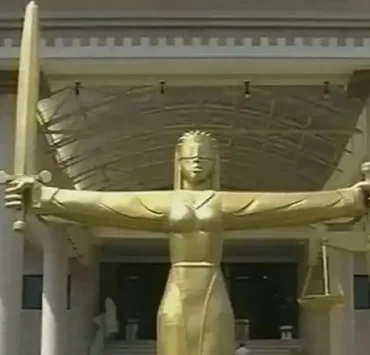Court Dismisses Suit Seeking to Stop General Election

Lawyard is a legal media and services platform that provides…
A Federal High Court, Abuja, on Wednesday, dismissed a suit seeking to stop the forthcoming general elections over the exclusion of eligible Nigerians living abroad.
Justice Inyang Ekwo, in a judgment, held that the existing law in the country did not guarantee the right of Nigerians in the Diaspora to vote in any election, hence, the suit lacked merit.
Justice Ekwo said where a right was not provided for in the constitution, there was no need to enforce that law.
According to him, where there is no law on an issue, there is no issue of the question of law on it.
He said it was the duty of those affected by the issue to engage the legislature do that law is enacted to resolve their issue.
“The court does not enact laws. It cannot also expand the law in order to accommodate an issue before it no matter how sympathetic or humanitarian the cause or situation is.
“It only interprets and expounds the laws, and, it is the law as stated before in this judgment, that when interpreting the provisions of a statute, the court must not ascribe meanings to clear, plain and unambiguous provisions in order to make such provisions conform to the court’s view of their meanings or what they ought to be,” he said.
The judge said by the provisions of Sections 77 (2) and 117 (2) of the 1999 Constitution (as amended), “the right to vote is reserved for every citizen of Nigeria, who has attained the age of 18 years residing in Nigeria at the time of registration of voters for the purpose of election to a legislative house, shall be entitled to be registered as a voter for that election.
“The right to vote for a president or governor is tied to the right to vote in an election of any legislative house, going by the provisions of Sections 132 (5) and 178 (5) of the 1999 Constitution (as amended),” he said.
Justice Ekwo further said though the applicants were praying the court to declare that Nigerians in the diaspora were entitled to vote in the forthcoming elections, he said it was the phrase “residing in Nigeria” in the provisions of the constitution that had challenged and indeed, removed the foundation of their case.
Besides, he observed that their application was only filed on Nov. 9, 2022, at the eleventh hour of the general elections.
“The applicants can only be commended for bringing this matter to the fore.
“However, the court is not where the solution lies for now.
“What this case has revealed is that there is a lacuna in the existing law with respect to the right of Nigerians in the diaspora to vote in elections in Nigeria.
“The lacuna here is not such that the court can fill by pronouncement or by importing statutory provisions from anywhere.
“There is a situation whose solution is by legislative and not judicial process,” he said.
Justice Ekwo, consequently, dismissed the suit for lacking in merit.
2 plaintiffs: Mr Chikwe Nkemnacho and Mr Kenneth Azubuike Nkemnacho, on behalf of Nigerians in the Diaspora, had filed the suit.
Lawyard is a legal media and services platform that provides enlightenment and access to legal services to members of the public (individuals and businesses) while also availing lawyers of needed information on new trends and resources in various areas of practice.













